Travel and Tourism Business Toolkit Report: Thomas Cook Group Analysis
VerifiedAdded on 2023/01/12
|13
|4477
|44
Report
AI Summary
This report provides a comprehensive analysis of the Travel and Tourism Business Toolkit, focusing on revenue management principles, the HR lifecycle, and financial statements within the context of the Thomas Cook Group. The report begins with an introduction to business toolkits and their importance, then delves into revenue management, explaining its rationale and principles, and how it's applied within the travel and tourism industry, specifically referencing Thomas Cook Group. The report then examines the HR lifecycle, detailing each stage and its application to a specific job role (HR Manager), along with a performance management plan. It further explores relevant legislation, company employment, and contract law. Finally, the report covers financial statements relevant to the tourism industry and the importance of budgeting for business performance control. The conclusion summarizes the key findings, emphasizing the interconnectedness of these elements in ensuring business success within the travel and tourism sector.
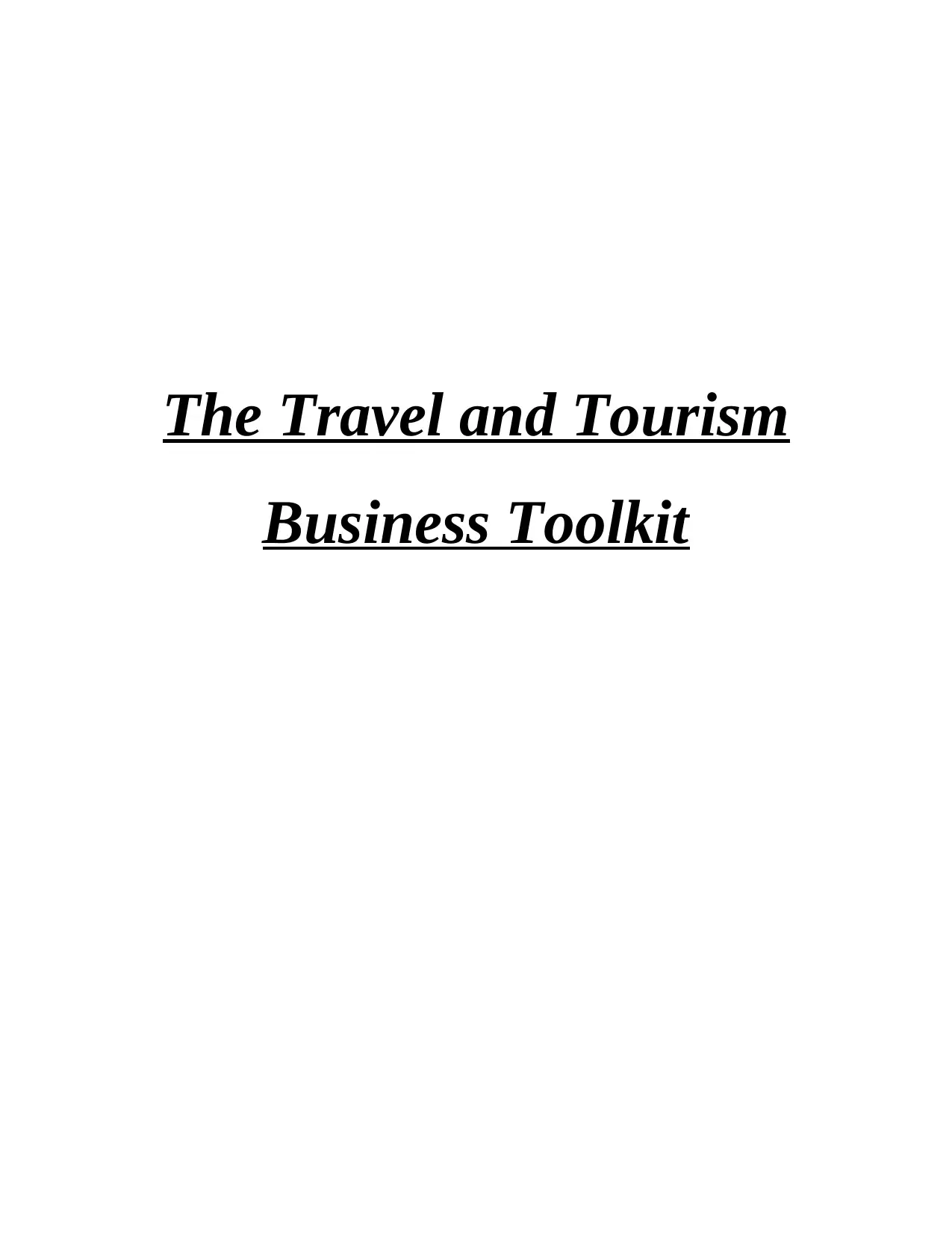
The Travel and Tourism
Business Toolkit
Business Toolkit
Paraphrase This Document
Need a fresh take? Get an instant paraphrase of this document with our AI Paraphraser
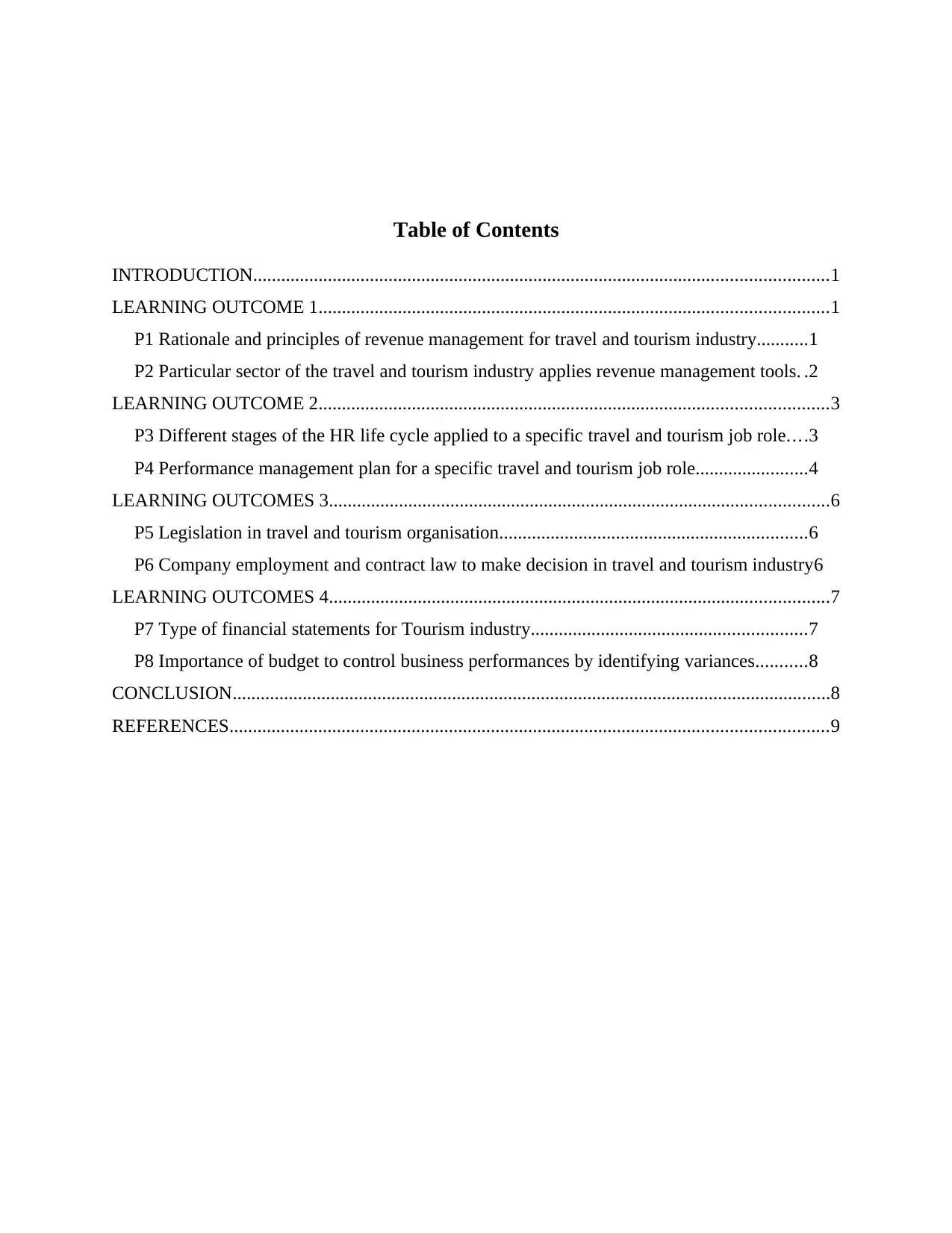
Table of Contents
INTRODUCTION...........................................................................................................................1
LEARNING OUTCOME 1.............................................................................................................1
P1 Rationale and principles of revenue management for travel and tourism industry...........1
P2 Particular sector of the travel and tourism industry applies revenue management tools. .2
LEARNING OUTCOME 2.............................................................................................................3
P3 Different stages of the HR life cycle applied to a specific travel and tourism job role....3
P4 Performance management plan for a specific travel and tourism job role........................4
LEARNING OUTCOMES 3...........................................................................................................6
P5 Legislation in travel and tourism organisation..................................................................6
P6 Company employment and contract law to make decision in travel and tourism industry6
LEARNING OUTCOMES 4...........................................................................................................7
P7 Type of financial statements for Tourism industry...........................................................7
P8 Importance of budget to control business performances by identifying variances...........8
CONCLUSION................................................................................................................................8
REFERENCES................................................................................................................................9
INTRODUCTION...........................................................................................................................1
LEARNING OUTCOME 1.............................................................................................................1
P1 Rationale and principles of revenue management for travel and tourism industry...........1
P2 Particular sector of the travel and tourism industry applies revenue management tools. .2
LEARNING OUTCOME 2.............................................................................................................3
P3 Different stages of the HR life cycle applied to a specific travel and tourism job role....3
P4 Performance management plan for a specific travel and tourism job role........................4
LEARNING OUTCOMES 3...........................................................................................................6
P5 Legislation in travel and tourism organisation..................................................................6
P6 Company employment and contract law to make decision in travel and tourism industry6
LEARNING OUTCOMES 4...........................................................................................................7
P7 Type of financial statements for Tourism industry...........................................................7
P8 Importance of budget to control business performances by identifying variances...........8
CONCLUSION................................................................................................................................8
REFERENCES................................................................................................................................9
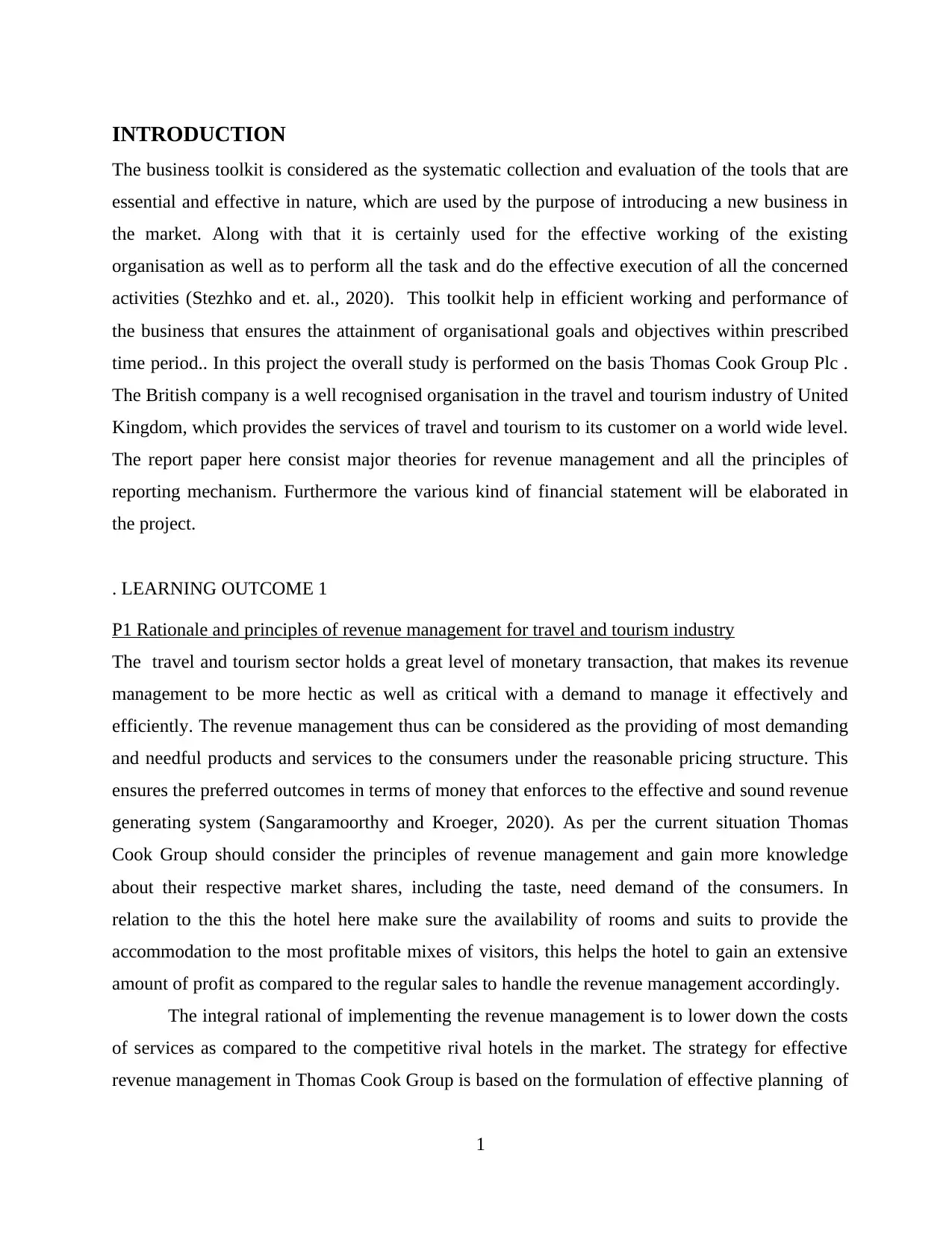
INTRODUCTION
The business toolkit is considered as the systematic collection and evaluation of the tools that are
essential and effective in nature, which are used by the purpose of introducing a new business in
the market. Along with that it is certainly used for the effective working of the existing
organisation as well as to perform all the task and do the effective execution of all the concerned
activities (Stezhko and et. al., 2020). This toolkit help in efficient working and performance of
the business that ensures the attainment of organisational goals and objectives within prescribed
time period.. In this project the overall study is performed on the basis Thomas Cook Group Plc .
The British company is a well recognised organisation in the travel and tourism industry of United
Kingdom, which provides the services of travel and tourism to its customer on a world wide level.
The report paper here consist major theories for revenue management and all the principles of
reporting mechanism. Furthermore the various kind of financial statement will be elaborated in
the project.
. LEARNING OUTCOME 1
P1 Rationale and principles of revenue management for travel and tourism industry
The travel and tourism sector holds a great level of monetary transaction, that makes its revenue
management to be more hectic as well as critical with a demand to manage it effectively and
efficiently. The revenue management thus can be considered as the providing of most demanding
and needful products and services to the consumers under the reasonable pricing structure. This
ensures the preferred outcomes in terms of money that enforces to the effective and sound revenue
generating system (Sangaramoorthy and Kroeger, 2020). As per the current situation Thomas
Cook Group should consider the principles of revenue management and gain more knowledge
about their respective market shares, including the taste, need demand of the consumers. In
relation to the this the hotel here make sure the availability of rooms and suits to provide the
accommodation to the most profitable mixes of visitors, this helps the hotel to gain an extensive
amount of profit as compared to the regular sales to handle the revenue management accordingly.
The integral rational of implementing the revenue management is to lower down the costs
of services as compared to the competitive rival hotels in the market. The strategy for effective
revenue management in Thomas Cook Group is based on the formulation of effective planning of
1
The business toolkit is considered as the systematic collection and evaluation of the tools that are
essential and effective in nature, which are used by the purpose of introducing a new business in
the market. Along with that it is certainly used for the effective working of the existing
organisation as well as to perform all the task and do the effective execution of all the concerned
activities (Stezhko and et. al., 2020). This toolkit help in efficient working and performance of
the business that ensures the attainment of organisational goals and objectives within prescribed
time period.. In this project the overall study is performed on the basis Thomas Cook Group Plc .
The British company is a well recognised organisation in the travel and tourism industry of United
Kingdom, which provides the services of travel and tourism to its customer on a world wide level.
The report paper here consist major theories for revenue management and all the principles of
reporting mechanism. Furthermore the various kind of financial statement will be elaborated in
the project.
. LEARNING OUTCOME 1
P1 Rationale and principles of revenue management for travel and tourism industry
The travel and tourism sector holds a great level of monetary transaction, that makes its revenue
management to be more hectic as well as critical with a demand to manage it effectively and
efficiently. The revenue management thus can be considered as the providing of most demanding
and needful products and services to the consumers under the reasonable pricing structure. This
ensures the preferred outcomes in terms of money that enforces to the effective and sound revenue
generating system (Sangaramoorthy and Kroeger, 2020). As per the current situation Thomas
Cook Group should consider the principles of revenue management and gain more knowledge
about their respective market shares, including the taste, need demand of the consumers. In
relation to the this the hotel here make sure the availability of rooms and suits to provide the
accommodation to the most profitable mixes of visitors, this helps the hotel to gain an extensive
amount of profit as compared to the regular sales to handle the revenue management accordingly.
The integral rational of implementing the revenue management is to lower down the costs
of services as compared to the competitive rival hotels in the market. The strategy for effective
revenue management in Thomas Cook Group is based on the formulation of effective planning of
1
⊘ This is a preview!⊘
Do you want full access?
Subscribe today to unlock all pages.

Trusted by 1+ million students worldwide
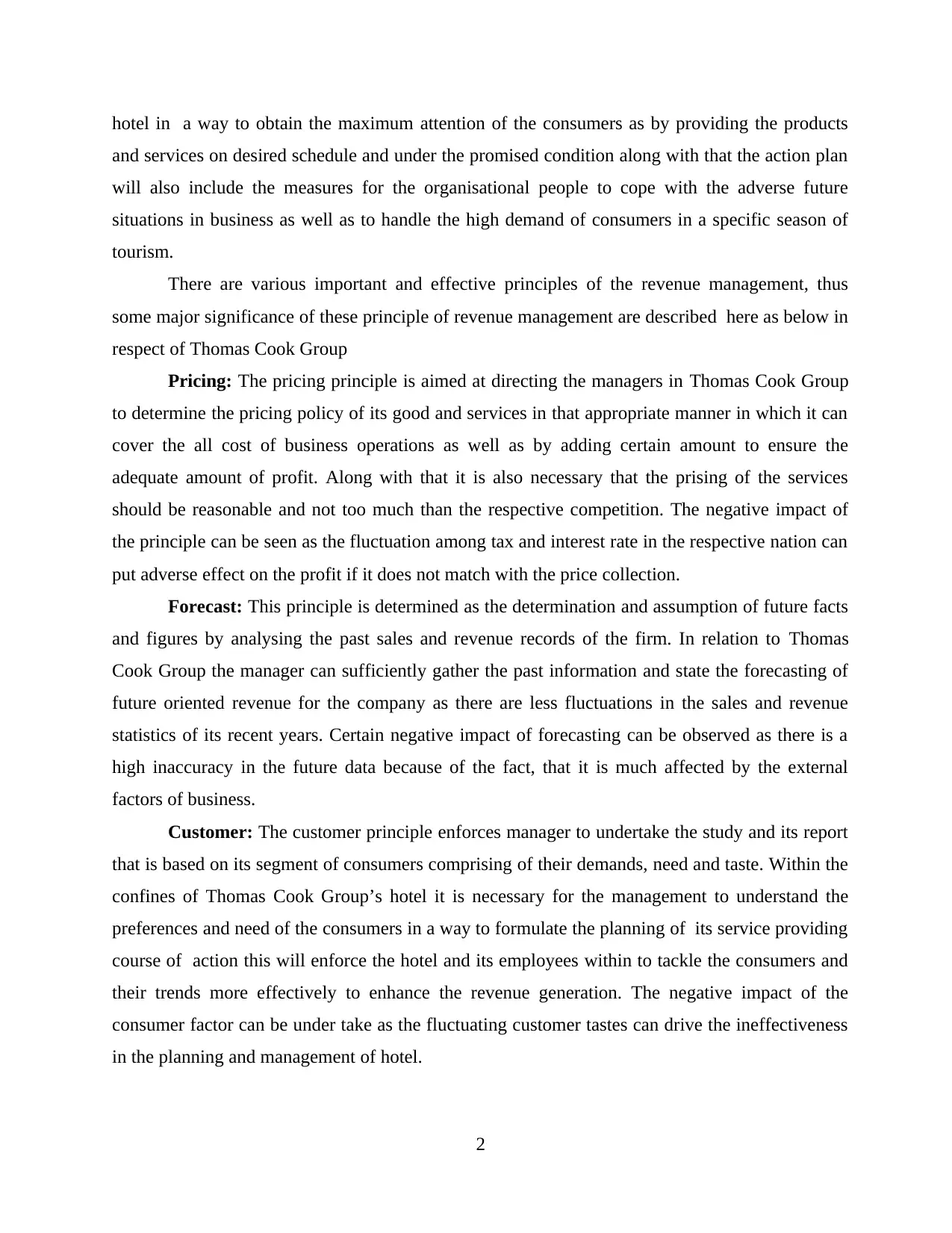
hotel in a way to obtain the maximum attention of the consumers as by providing the products
and services on desired schedule and under the promised condition along with that the action plan
will also include the measures for the organisational people to cope with the adverse future
situations in business as well as to handle the high demand of consumers in a specific season of
tourism.
There are various important and effective principles of the revenue management, thus
some major significance of these principle of revenue management are described here as below in
respect of Thomas Cook Group
Pricing: The pricing principle is aimed at directing the managers in Thomas Cook Group
to determine the pricing policy of its good and services in that appropriate manner in which it can
cover the all cost of business operations as well as by adding certain amount to ensure the
adequate amount of profit. Along with that it is also necessary that the prising of the services
should be reasonable and not too much than the respective competition. The negative impact of
the principle can be seen as the fluctuation among tax and interest rate in the respective nation can
put adverse effect on the profit if it does not match with the price collection.
Forecast: This principle is determined as the determination and assumption of future facts
and figures by analysing the past sales and revenue records of the firm. In relation to Thomas
Cook Group the manager can sufficiently gather the past information and state the forecasting of
future oriented revenue for the company as there are less fluctuations in the sales and revenue
statistics of its recent years. Certain negative impact of forecasting can be observed as there is a
high inaccuracy in the future data because of the fact, that it is much affected by the external
factors of business.
Customer: The customer principle enforces manager to undertake the study and its report
that is based on its segment of consumers comprising of their demands, need and taste. Within the
confines of Thomas Cook Group’s hotel it is necessary for the management to understand the
preferences and need of the consumers in a way to formulate the planning of its service providing
course of action this will enforce the hotel and its employees within to tackle the consumers and
their trends more effectively to enhance the revenue generation. The negative impact of the
consumer factor can be under take as the fluctuating customer tastes can drive the ineffectiveness
in the planning and management of hotel.
2
and services on desired schedule and under the promised condition along with that the action plan
will also include the measures for the organisational people to cope with the adverse future
situations in business as well as to handle the high demand of consumers in a specific season of
tourism.
There are various important and effective principles of the revenue management, thus
some major significance of these principle of revenue management are described here as below in
respect of Thomas Cook Group
Pricing: The pricing principle is aimed at directing the managers in Thomas Cook Group
to determine the pricing policy of its good and services in that appropriate manner in which it can
cover the all cost of business operations as well as by adding certain amount to ensure the
adequate amount of profit. Along with that it is also necessary that the prising of the services
should be reasonable and not too much than the respective competition. The negative impact of
the principle can be seen as the fluctuation among tax and interest rate in the respective nation can
put adverse effect on the profit if it does not match with the price collection.
Forecast: This principle is determined as the determination and assumption of future facts
and figures by analysing the past sales and revenue records of the firm. In relation to Thomas
Cook Group the manager can sufficiently gather the past information and state the forecasting of
future oriented revenue for the company as there are less fluctuations in the sales and revenue
statistics of its recent years. Certain negative impact of forecasting can be observed as there is a
high inaccuracy in the future data because of the fact, that it is much affected by the external
factors of business.
Customer: The customer principle enforces manager to undertake the study and its report
that is based on its segment of consumers comprising of their demands, need and taste. Within the
confines of Thomas Cook Group’s hotel it is necessary for the management to understand the
preferences and need of the consumers in a way to formulate the planning of its service providing
course of action this will enforce the hotel and its employees within to tackle the consumers and
their trends more effectively to enhance the revenue generation. The negative impact of the
consumer factor can be under take as the fluctuating customer tastes can drive the ineffectiveness
in the planning and management of hotel.
2
Paraphrase This Document
Need a fresh take? Get an instant paraphrase of this document with our AI Paraphraser
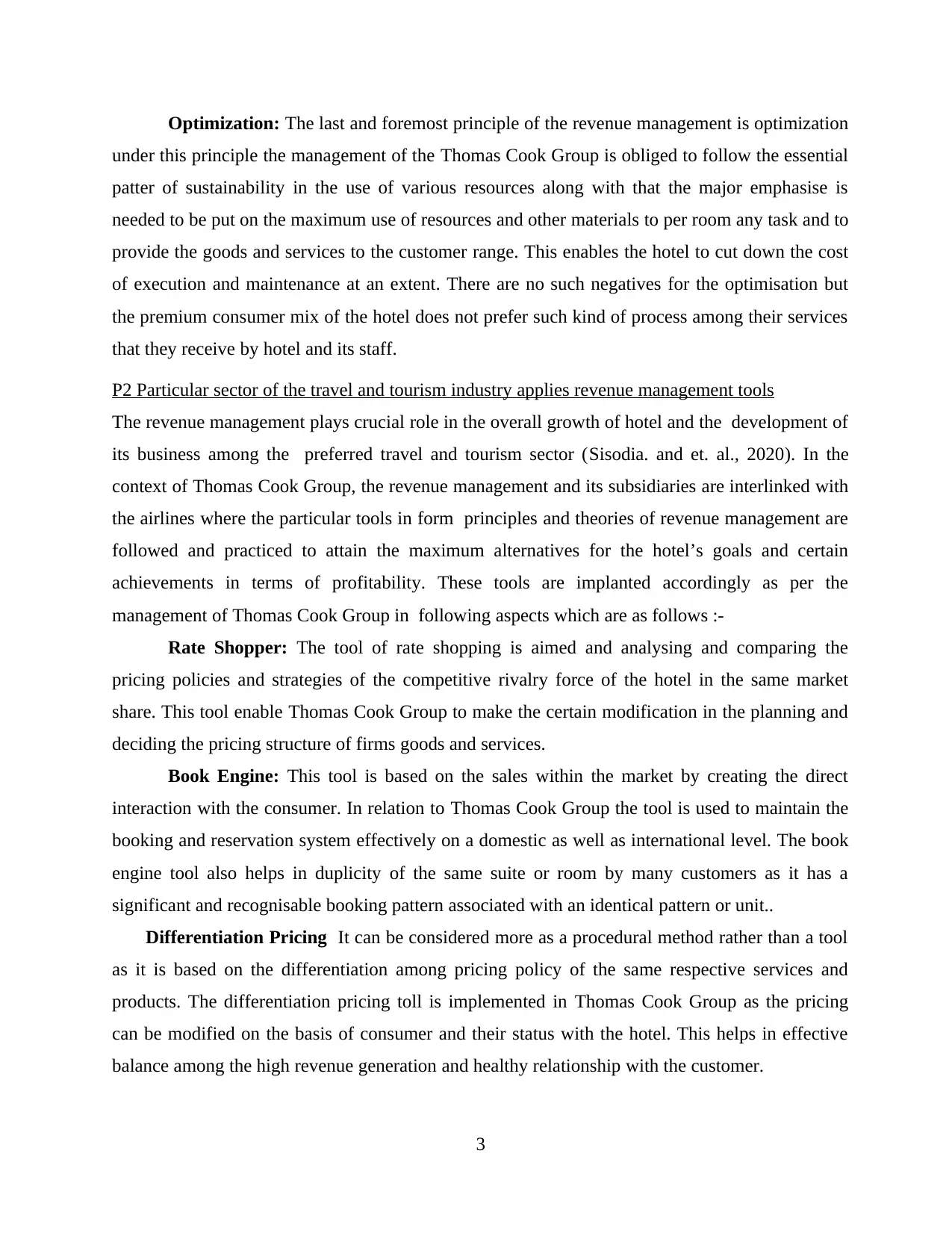
Optimization: The last and foremost principle of the revenue management is optimization
under this principle the management of the Thomas Cook Group is obliged to follow the essential
patter of sustainability in the use of various resources along with that the major emphasise is
needed to be put on the maximum use of resources and other materials to per room any task and to
provide the goods and services to the customer range. This enables the hotel to cut down the cost
of execution and maintenance at an extent. There are no such negatives for the optimisation but
the premium consumer mix of the hotel does not prefer such kind of process among their services
that they receive by hotel and its staff.
P2 Particular sector of the travel and tourism industry applies revenue management tools
The revenue management plays crucial role in the overall growth of hotel and the development of
its business among the preferred travel and tourism sector (Sisodia. and et. al., 2020). In the
context of Thomas Cook Group, the revenue management and its subsidiaries are interlinked with
the airlines where the particular tools in form principles and theories of revenue management are
followed and practiced to attain the maximum alternatives for the hotel’s goals and certain
achievements in terms of profitability. These tools are implanted accordingly as per the
management of Thomas Cook Group in following aspects which are as follows :-
Rate Shopper: The tool of rate shopping is aimed and analysing and comparing the
pricing policies and strategies of the competitive rivalry force of the hotel in the same market
share. This tool enable Thomas Cook Group to make the certain modification in the planning and
deciding the pricing structure of firms goods and services.
Book Engine: This tool is based on the sales within the market by creating the direct
interaction with the consumer. In relation to Thomas Cook Group the tool is used to maintain the
booking and reservation system effectively on a domestic as well as international level. The book
engine tool also helps in duplicity of the same suite or room by many customers as it has a
significant and recognisable booking pattern associated with an identical pattern or unit..
Differentiation Pricing It can be considered more as a procedural method rather than a tool
as it is based on the differentiation among pricing policy of the same respective services and
products. The differentiation pricing toll is implemented in Thomas Cook Group as the pricing
can be modified on the basis of consumer and their status with the hotel. This helps in effective
balance among the high revenue generation and healthy relationship with the customer.
3
under this principle the management of the Thomas Cook Group is obliged to follow the essential
patter of sustainability in the use of various resources along with that the major emphasise is
needed to be put on the maximum use of resources and other materials to per room any task and to
provide the goods and services to the customer range. This enables the hotel to cut down the cost
of execution and maintenance at an extent. There are no such negatives for the optimisation but
the premium consumer mix of the hotel does not prefer such kind of process among their services
that they receive by hotel and its staff.
P2 Particular sector of the travel and tourism industry applies revenue management tools
The revenue management plays crucial role in the overall growth of hotel and the development of
its business among the preferred travel and tourism sector (Sisodia. and et. al., 2020). In the
context of Thomas Cook Group, the revenue management and its subsidiaries are interlinked with
the airlines where the particular tools in form principles and theories of revenue management are
followed and practiced to attain the maximum alternatives for the hotel’s goals and certain
achievements in terms of profitability. These tools are implanted accordingly as per the
management of Thomas Cook Group in following aspects which are as follows :-
Rate Shopper: The tool of rate shopping is aimed and analysing and comparing the
pricing policies and strategies of the competitive rivalry force of the hotel in the same market
share. This tool enable Thomas Cook Group to make the certain modification in the planning and
deciding the pricing structure of firms goods and services.
Book Engine: This tool is based on the sales within the market by creating the direct
interaction with the consumer. In relation to Thomas Cook Group the tool is used to maintain the
booking and reservation system effectively on a domestic as well as international level. The book
engine tool also helps in duplicity of the same suite or room by many customers as it has a
significant and recognisable booking pattern associated with an identical pattern or unit..
Differentiation Pricing It can be considered more as a procedural method rather than a tool
as it is based on the differentiation among pricing policy of the same respective services and
products. The differentiation pricing toll is implemented in Thomas Cook Group as the pricing
can be modified on the basis of consumer and their status with the hotel. This helps in effective
balance among the high revenue generation and healthy relationship with the customer.
3
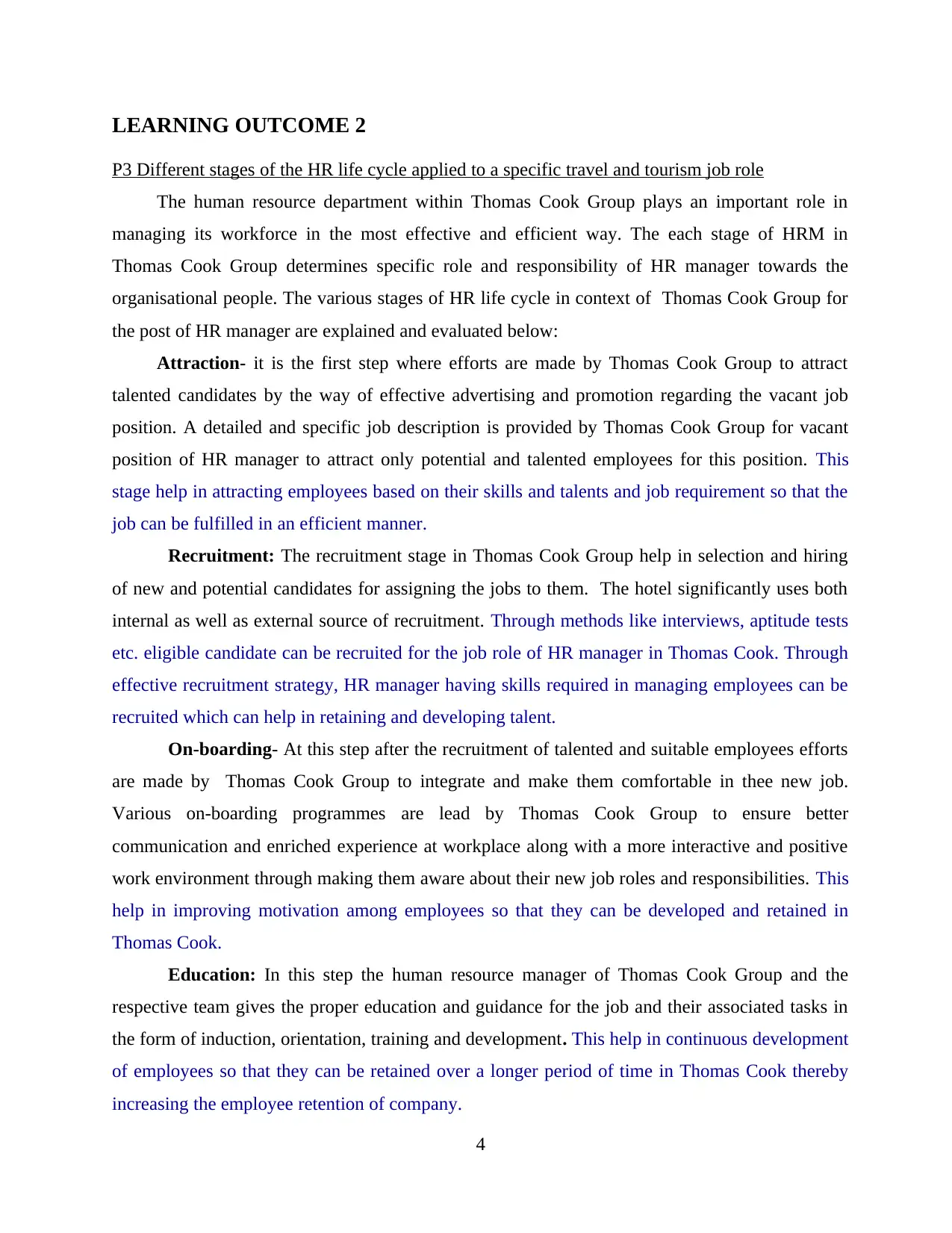
LEARNING OUTCOME 2
P3 Different stages of the HR life cycle applied to a specific travel and tourism job role
The human resource department within Thomas Cook Group plays an important role in
managing its workforce in the most effective and efficient way. The each stage of HRM in
Thomas Cook Group determines specific role and responsibility of HR manager towards the
organisational people. The various stages of HR life cycle in context of Thomas Cook Group for
the post of HR manager are explained and evaluated below:
Attraction- it is the first step where efforts are made by Thomas Cook Group to attract
talented candidates by the way of effective advertising and promotion regarding the vacant job
position. A detailed and specific job description is provided by Thomas Cook Group for vacant
position of HR manager to attract only potential and talented employees for this position. This
stage help in attracting employees based on their skills and talents and job requirement so that the
job can be fulfilled in an efficient manner.
Recruitment: The recruitment stage in Thomas Cook Group help in selection and hiring
of new and potential candidates for assigning the jobs to them. The hotel significantly uses both
internal as well as external source of recruitment. Through methods like interviews, aptitude tests
etc. eligible candidate can be recruited for the job role of HR manager in Thomas Cook. Through
effective recruitment strategy, HR manager having skills required in managing employees can be
recruited which can help in retaining and developing talent.
On-boarding- At this step after the recruitment of talented and suitable employees efforts
are made by Thomas Cook Group to integrate and make them comfortable in thee new job.
Various on-boarding programmes are lead by Thomas Cook Group to ensure better
communication and enriched experience at workplace along with a more interactive and positive
work environment through making them aware about their new job roles and responsibilities. This
help in improving motivation among employees so that they can be developed and retained in
Thomas Cook.
Education: In this step the human resource manager of Thomas Cook Group and the
respective team gives the proper education and guidance for the job and their associated tasks in
the form of induction, orientation, training and development. This help in continuous development
of employees so that they can be retained over a longer period of time in Thomas Cook thereby
increasing the employee retention of company.
4
P3 Different stages of the HR life cycle applied to a specific travel and tourism job role
The human resource department within Thomas Cook Group plays an important role in
managing its workforce in the most effective and efficient way. The each stage of HRM in
Thomas Cook Group determines specific role and responsibility of HR manager towards the
organisational people. The various stages of HR life cycle in context of Thomas Cook Group for
the post of HR manager are explained and evaluated below:
Attraction- it is the first step where efforts are made by Thomas Cook Group to attract
talented candidates by the way of effective advertising and promotion regarding the vacant job
position. A detailed and specific job description is provided by Thomas Cook Group for vacant
position of HR manager to attract only potential and talented employees for this position. This
stage help in attracting employees based on their skills and talents and job requirement so that the
job can be fulfilled in an efficient manner.
Recruitment: The recruitment stage in Thomas Cook Group help in selection and hiring
of new and potential candidates for assigning the jobs to them. The hotel significantly uses both
internal as well as external source of recruitment. Through methods like interviews, aptitude tests
etc. eligible candidate can be recruited for the job role of HR manager in Thomas Cook. Through
effective recruitment strategy, HR manager having skills required in managing employees can be
recruited which can help in retaining and developing talent.
On-boarding- At this step after the recruitment of talented and suitable employees efforts
are made by Thomas Cook Group to integrate and make them comfortable in thee new job.
Various on-boarding programmes are lead by Thomas Cook Group to ensure better
communication and enriched experience at workplace along with a more interactive and positive
work environment through making them aware about their new job roles and responsibilities. This
help in improving motivation among employees so that they can be developed and retained in
Thomas Cook.
Education: In this step the human resource manager of Thomas Cook Group and the
respective team gives the proper education and guidance for the job and their associated tasks in
the form of induction, orientation, training and development. This help in continuous development
of employees so that they can be retained over a longer period of time in Thomas Cook thereby
increasing the employee retention of company.
4
⊘ This is a preview!⊘
Do you want full access?
Subscribe today to unlock all pages.

Trusted by 1+ million students worldwide
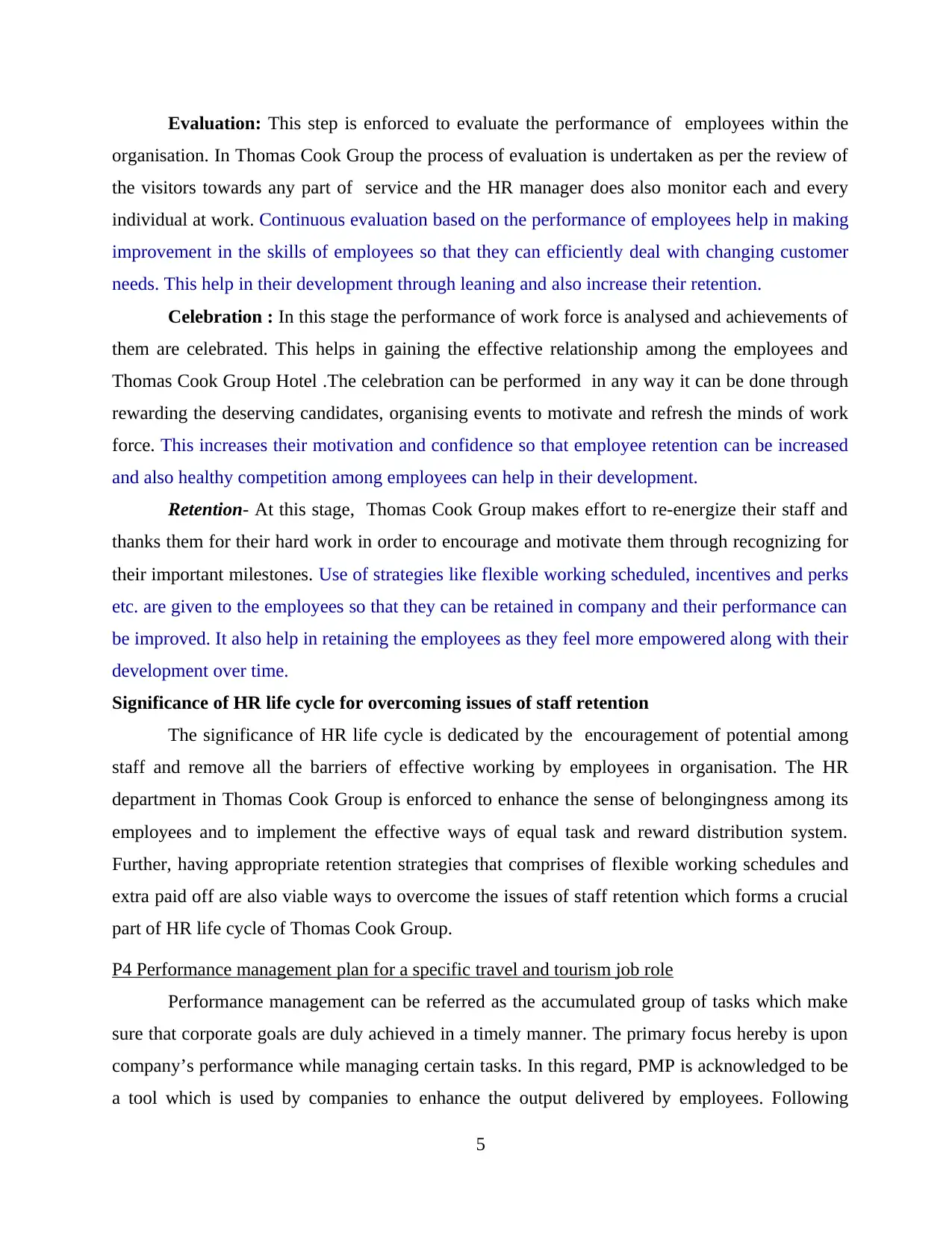
Evaluation: This step is enforced to evaluate the performance of employees within the
organisation. In Thomas Cook Group the process of evaluation is undertaken as per the review of
the visitors towards any part of service and the HR manager does also monitor each and every
individual at work. Continuous evaluation based on the performance of employees help in making
improvement in the skills of employees so that they can efficiently deal with changing customer
needs. This help in their development through leaning and also increase their retention.
Celebration : In this stage the performance of work force is analysed and achievements of
them are celebrated. This helps in gaining the effective relationship among the employees and
Thomas Cook Group Hotel .The celebration can be performed in any way it can be done through
rewarding the deserving candidates, organising events to motivate and refresh the minds of work
force. This increases their motivation and confidence so that employee retention can be increased
and also healthy competition among employees can help in their development.
Retention- At this stage, Thomas Cook Group makes effort to re-energize their staff and
thanks them for their hard work in order to encourage and motivate them through recognizing for
their important milestones. Use of strategies like flexible working scheduled, incentives and perks
etc. are given to the employees so that they can be retained in company and their performance can
be improved. It also help in retaining the employees as they feel more empowered along with their
development over time.
Significance of HR life cycle for overcoming issues of staff retention
The significance of HR life cycle is dedicated by the encouragement of potential among
staff and remove all the barriers of effective working by employees in organisation. The HR
department in Thomas Cook Group is enforced to enhance the sense of belongingness among its
employees and to implement the effective ways of equal task and reward distribution system.
Further, having appropriate retention strategies that comprises of flexible working schedules and
extra paid off are also viable ways to overcome the issues of staff retention which forms a crucial
part of HR life cycle of Thomas Cook Group.
P4 Performance management plan for a specific travel and tourism job role
Performance management can be referred as the accumulated group of tasks which make
sure that corporate goals are duly achieved in a timely manner. The primary focus hereby is upon
company’s performance while managing certain tasks. In this regard, PMP is acknowledged to be
a tool which is used by companies to enhance the output delivered by employees. Following
5
organisation. In Thomas Cook Group the process of evaluation is undertaken as per the review of
the visitors towards any part of service and the HR manager does also monitor each and every
individual at work. Continuous evaluation based on the performance of employees help in making
improvement in the skills of employees so that they can efficiently deal with changing customer
needs. This help in their development through leaning and also increase their retention.
Celebration : In this stage the performance of work force is analysed and achievements of
them are celebrated. This helps in gaining the effective relationship among the employees and
Thomas Cook Group Hotel .The celebration can be performed in any way it can be done through
rewarding the deserving candidates, organising events to motivate and refresh the minds of work
force. This increases their motivation and confidence so that employee retention can be increased
and also healthy competition among employees can help in their development.
Retention- At this stage, Thomas Cook Group makes effort to re-energize their staff and
thanks them for their hard work in order to encourage and motivate them through recognizing for
their important milestones. Use of strategies like flexible working scheduled, incentives and perks
etc. are given to the employees so that they can be retained in company and their performance can
be improved. It also help in retaining the employees as they feel more empowered along with their
development over time.
Significance of HR life cycle for overcoming issues of staff retention
The significance of HR life cycle is dedicated by the encouragement of potential among
staff and remove all the barriers of effective working by employees in organisation. The HR
department in Thomas Cook Group is enforced to enhance the sense of belongingness among its
employees and to implement the effective ways of equal task and reward distribution system.
Further, having appropriate retention strategies that comprises of flexible working schedules and
extra paid off are also viable ways to overcome the issues of staff retention which forms a crucial
part of HR life cycle of Thomas Cook Group.
P4 Performance management plan for a specific travel and tourism job role
Performance management can be referred as the accumulated group of tasks which make
sure that corporate goals are duly achieved in a timely manner. The primary focus hereby is upon
company’s performance while managing certain tasks. In this regard, PMP is acknowledged to be
a tool which is used by companies to enhance the output delivered by employees. Following
5
Paraphrase This Document
Need a fresh take? Get an instant paraphrase of this document with our AI Paraphraser
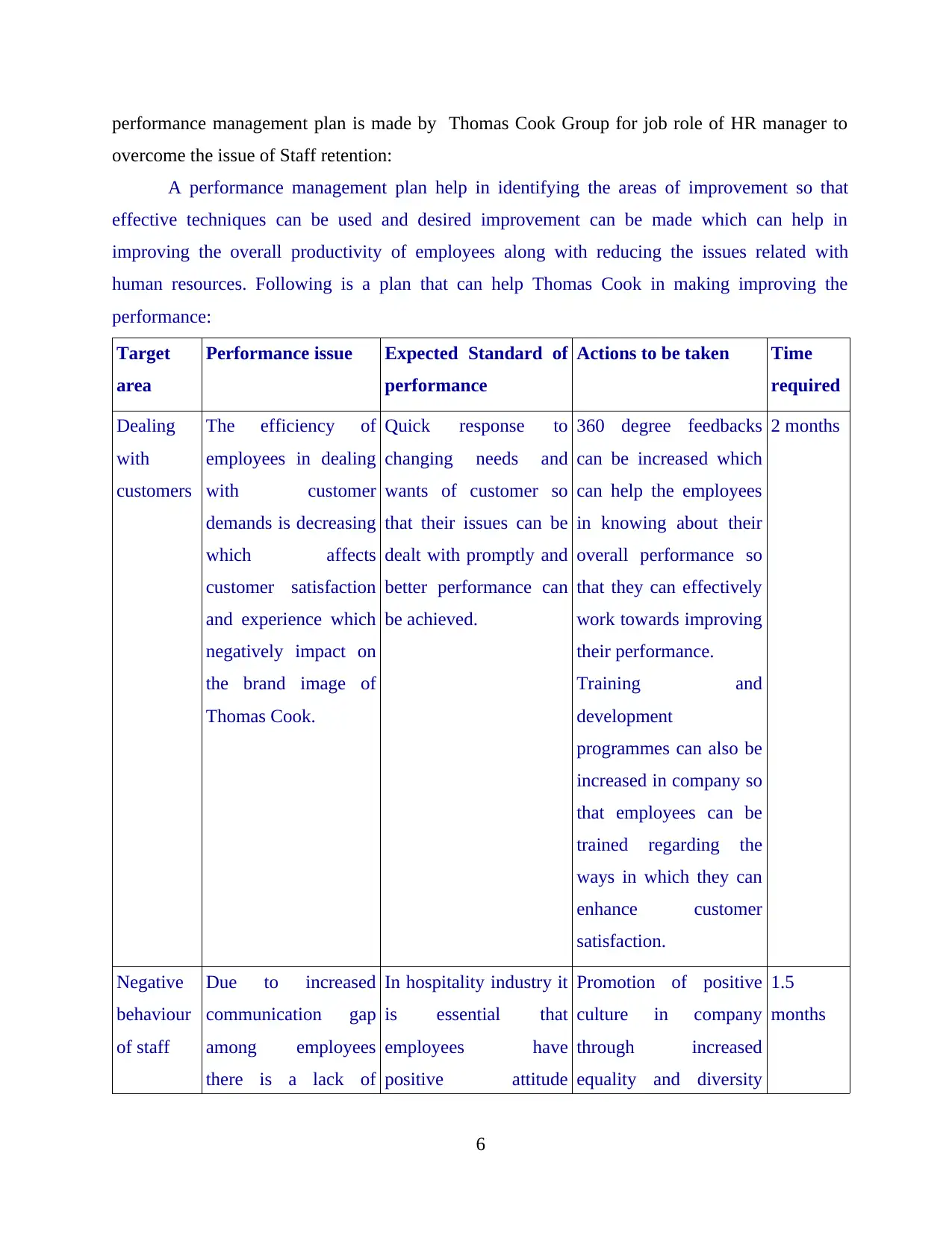
performance management plan is made by Thomas Cook Group for job role of HR manager to
overcome the issue of Staff retention:
A performance management plan help in identifying the areas of improvement so that
effective techniques can be used and desired improvement can be made which can help in
improving the overall productivity of employees along with reducing the issues related with
human resources. Following is a plan that can help Thomas Cook in making improving the
performance:
Target
area
Performance issue Expected Standard of
performance
Actions to be taken Time
required
Dealing
with
customers
The efficiency of
employees in dealing
with customer
demands is decreasing
which affects
customer satisfaction
and experience which
negatively impact on
the brand image of
Thomas Cook.
Quick response to
changing needs and
wants of customer so
that their issues can be
dealt with promptly and
better performance can
be achieved.
360 degree feedbacks
can be increased which
can help the employees
in knowing about their
overall performance so
that they can effectively
work towards improving
their performance.
Training and
development
programmes can also be
increased in company so
that employees can be
trained regarding the
ways in which they can
enhance customer
satisfaction.
2 months
Negative
behaviour
of staff
Due to increased
communication gap
among employees
there is a lack of
In hospitality industry it
is essential that
employees have
positive attitude
Promotion of positive
culture in company
through increased
equality and diversity
1.5
months
6
overcome the issue of Staff retention:
A performance management plan help in identifying the areas of improvement so that
effective techniques can be used and desired improvement can be made which can help in
improving the overall productivity of employees along with reducing the issues related with
human resources. Following is a plan that can help Thomas Cook in making improving the
performance:
Target
area
Performance issue Expected Standard of
performance
Actions to be taken Time
required
Dealing
with
customers
The efficiency of
employees in dealing
with customer
demands is decreasing
which affects
customer satisfaction
and experience which
negatively impact on
the brand image of
Thomas Cook.
Quick response to
changing needs and
wants of customer so
that their issues can be
dealt with promptly and
better performance can
be achieved.
360 degree feedbacks
can be increased which
can help the employees
in knowing about their
overall performance so
that they can effectively
work towards improving
their performance.
Training and
development
programmes can also be
increased in company so
that employees can be
trained regarding the
ways in which they can
enhance customer
satisfaction.
2 months
Negative
behaviour
of staff
Due to increased
communication gap
among employees
there is a lack of
In hospitality industry it
is essential that
employees have
positive attitude
Promotion of positive
culture in company
through increased
equality and diversity
1.5
months
6
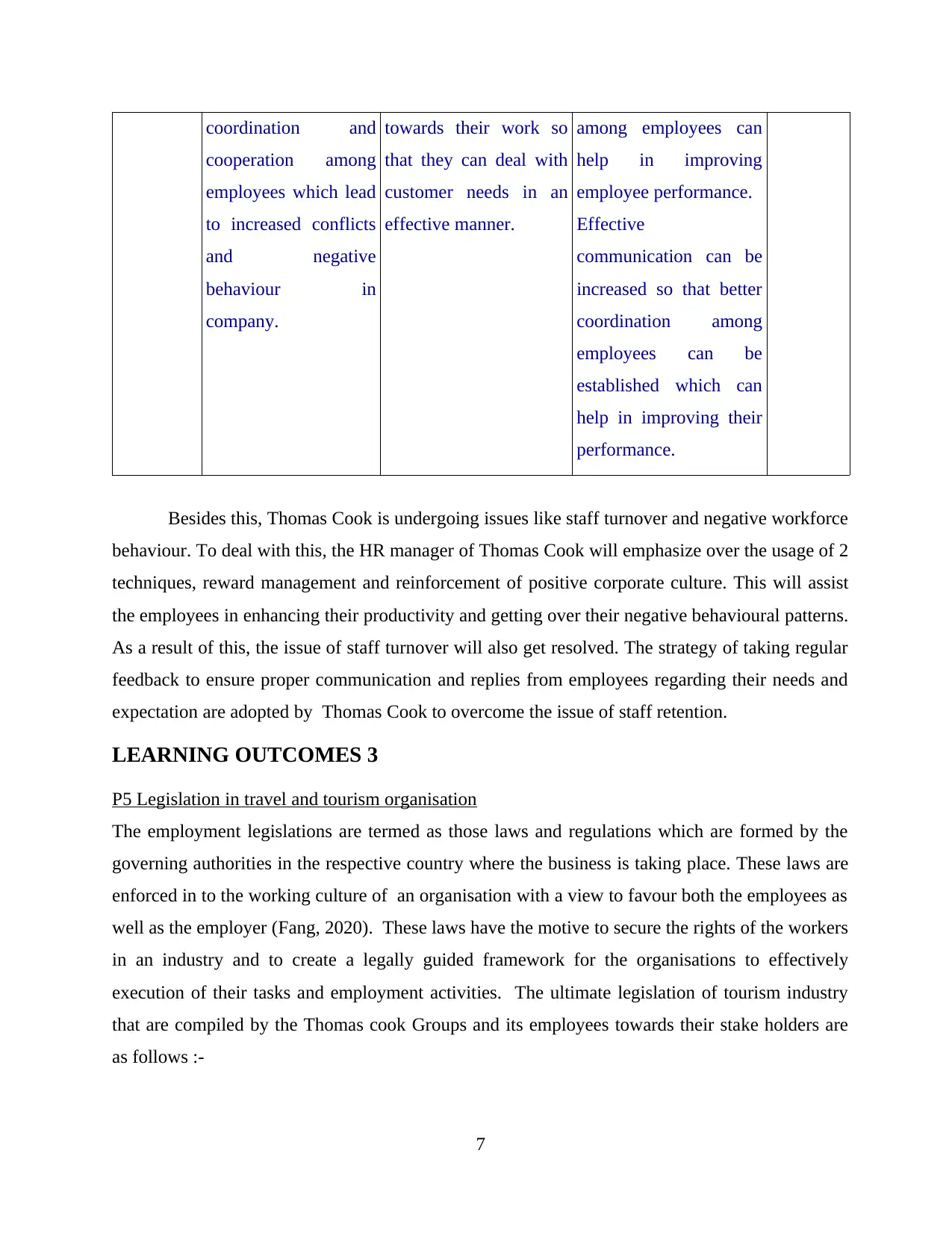
coordination and
cooperation among
employees which lead
to increased conflicts
and negative
behaviour in
company.
towards their work so
that they can deal with
customer needs in an
effective manner.
among employees can
help in improving
employee performance.
Effective
communication can be
increased so that better
coordination among
employees can be
established which can
help in improving their
performance.
Besides this, Thomas Cook is undergoing issues like staff turnover and negative workforce
behaviour. To deal with this, the HR manager of Thomas Cook will emphasize over the usage of 2
techniques, reward management and reinforcement of positive corporate culture. This will assist
the employees in enhancing their productivity and getting over their negative behavioural patterns.
As a result of this, the issue of staff turnover will also get resolved. The strategy of taking regular
feedback to ensure proper communication and replies from employees regarding their needs and
expectation are adopted by Thomas Cook to overcome the issue of staff retention.
LEARNING OUTCOMES 3
P5 Legislation in travel and tourism organisation
The employment legislations are termed as those laws and regulations which are formed by the
governing authorities in the respective country where the business is taking place. These laws are
enforced in to the working culture of an organisation with a view to favour both the employees as
well as the employer (Fang, 2020). These laws have the motive to secure the rights of the workers
in an industry and to create a legally guided framework for the organisations to effectively
execution of their tasks and employment activities. The ultimate legislation of tourism industry
that are compiled by the Thomas cook Groups and its employees towards their stake holders are
as follows :-
7
cooperation among
employees which lead
to increased conflicts
and negative
behaviour in
company.
towards their work so
that they can deal with
customer needs in an
effective manner.
among employees can
help in improving
employee performance.
Effective
communication can be
increased so that better
coordination among
employees can be
established which can
help in improving their
performance.
Besides this, Thomas Cook is undergoing issues like staff turnover and negative workforce
behaviour. To deal with this, the HR manager of Thomas Cook will emphasize over the usage of 2
techniques, reward management and reinforcement of positive corporate culture. This will assist
the employees in enhancing their productivity and getting over their negative behavioural patterns.
As a result of this, the issue of staff turnover will also get resolved. The strategy of taking regular
feedback to ensure proper communication and replies from employees regarding their needs and
expectation are adopted by Thomas Cook to overcome the issue of staff retention.
LEARNING OUTCOMES 3
P5 Legislation in travel and tourism organisation
The employment legislations are termed as those laws and regulations which are formed by the
governing authorities in the respective country where the business is taking place. These laws are
enforced in to the working culture of an organisation with a view to favour both the employees as
well as the employer (Fang, 2020). These laws have the motive to secure the rights of the workers
in an industry and to create a legally guided framework for the organisations to effectively
execution of their tasks and employment activities. The ultimate legislation of tourism industry
that are compiled by the Thomas cook Groups and its employees towards their stake holders are
as follows :-
7
⊘ This is a preview!⊘
Do you want full access?
Subscribe today to unlock all pages.

Trusted by 1+ million students worldwide
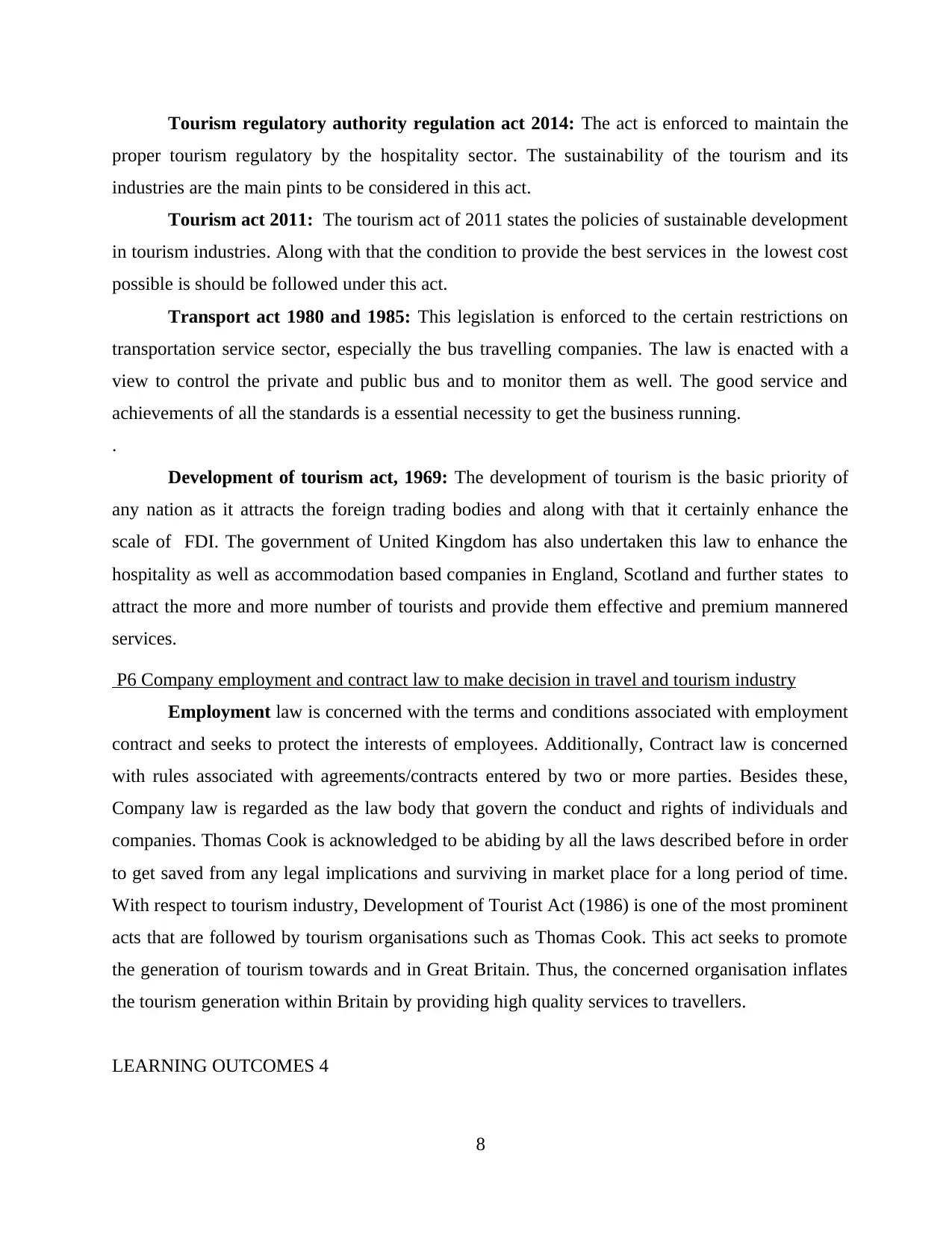
Tourism regulatory authority regulation act 2014: The act is enforced to maintain the
proper tourism regulatory by the hospitality sector. The sustainability of the tourism and its
industries are the main pints to be considered in this act.
Tourism act 2011: The tourism act of 2011 states the policies of sustainable development
in tourism industries. Along with that the condition to provide the best services in the lowest cost
possible is should be followed under this act.
Transport act 1980 and 1985: This legislation is enforced to the certain restrictions on
transportation service sector, especially the bus travelling companies. The law is enacted with a
view to control the private and public bus and to monitor them as well. The good service and
achievements of all the standards is a essential necessity to get the business running.
.
Development of tourism act, 1969: The development of tourism is the basic priority of
any nation as it attracts the foreign trading bodies and along with that it certainly enhance the
scale of FDI. The government of United Kingdom has also undertaken this law to enhance the
hospitality as well as accommodation based companies in England, Scotland and further states to
attract the more and more number of tourists and provide them effective and premium mannered
services.
P6 Company employment and contract law to make decision in travel and tourism industry
Employment law is concerned with the terms and conditions associated with employment
contract and seeks to protect the interests of employees. Additionally, Contract law is concerned
with rules associated with agreements/contracts entered by two or more parties. Besides these,
Company law is regarded as the law body that govern the conduct and rights of individuals and
companies. Thomas Cook is acknowledged to be abiding by all the laws described before in order
to get saved from any legal implications and surviving in market place for a long period of time.
With respect to tourism industry, Development of Tourist Act (1986) is one of the most prominent
acts that are followed by tourism organisations such as Thomas Cook. This act seeks to promote
the generation of tourism towards and in Great Britain. Thus, the concerned organisation inflates
the tourism generation within Britain by providing high quality services to travellers.
LEARNING OUTCOMES 4
8
proper tourism regulatory by the hospitality sector. The sustainability of the tourism and its
industries are the main pints to be considered in this act.
Tourism act 2011: The tourism act of 2011 states the policies of sustainable development
in tourism industries. Along with that the condition to provide the best services in the lowest cost
possible is should be followed under this act.
Transport act 1980 and 1985: This legislation is enforced to the certain restrictions on
transportation service sector, especially the bus travelling companies. The law is enacted with a
view to control the private and public bus and to monitor them as well. The good service and
achievements of all the standards is a essential necessity to get the business running.
.
Development of tourism act, 1969: The development of tourism is the basic priority of
any nation as it attracts the foreign trading bodies and along with that it certainly enhance the
scale of FDI. The government of United Kingdom has also undertaken this law to enhance the
hospitality as well as accommodation based companies in England, Scotland and further states to
attract the more and more number of tourists and provide them effective and premium mannered
services.
P6 Company employment and contract law to make decision in travel and tourism industry
Employment law is concerned with the terms and conditions associated with employment
contract and seeks to protect the interests of employees. Additionally, Contract law is concerned
with rules associated with agreements/contracts entered by two or more parties. Besides these,
Company law is regarded as the law body that govern the conduct and rights of individuals and
companies. Thomas Cook is acknowledged to be abiding by all the laws described before in order
to get saved from any legal implications and surviving in market place for a long period of time.
With respect to tourism industry, Development of Tourist Act (1986) is one of the most prominent
acts that are followed by tourism organisations such as Thomas Cook. This act seeks to promote
the generation of tourism towards and in Great Britain. Thus, the concerned organisation inflates
the tourism generation within Britain by providing high quality services to travellers.
LEARNING OUTCOMES 4
8
Paraphrase This Document
Need a fresh take? Get an instant paraphrase of this document with our AI Paraphraser
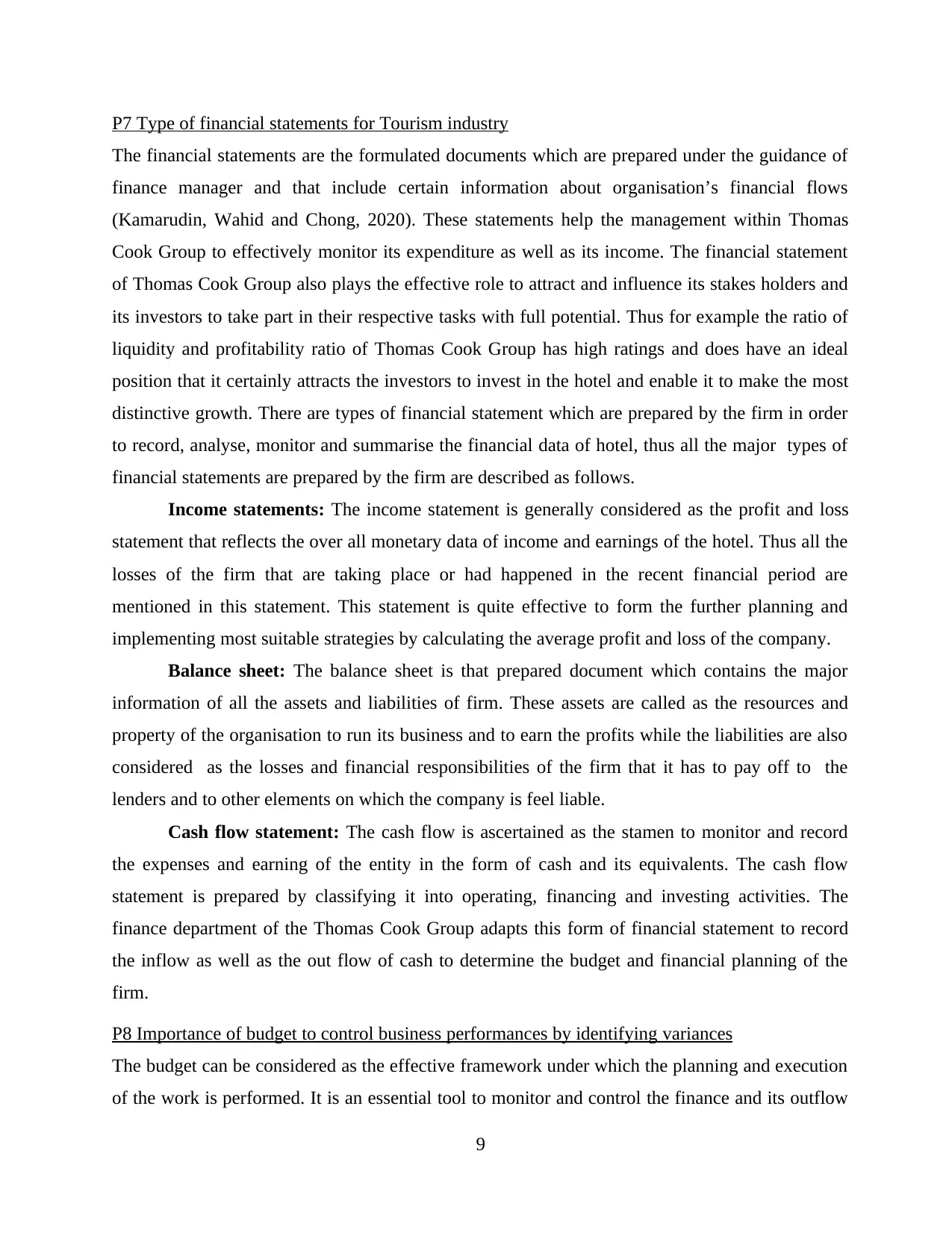
P7 Type of financial statements for Tourism industry
The financial statements are the formulated documents which are prepared under the guidance of
finance manager and that include certain information about organisation’s financial flows
(Kamarudin, Wahid and Chong, 2020). These statements help the management within Thomas
Cook Group to effectively monitor its expenditure as well as its income. The financial statement
of Thomas Cook Group also plays the effective role to attract and influence its stakes holders and
its investors to take part in their respective tasks with full potential. Thus for example the ratio of
liquidity and profitability ratio of Thomas Cook Group has high ratings and does have an ideal
position that it certainly attracts the investors to invest in the hotel and enable it to make the most
distinctive growth. There are types of financial statement which are prepared by the firm in order
to record, analyse, monitor and summarise the financial data of hotel, thus all the major types of
financial statements are prepared by the firm are described as follows.
Income statements: The income statement is generally considered as the profit and loss
statement that reflects the over all monetary data of income and earnings of the hotel. Thus all the
losses of the firm that are taking place or had happened in the recent financial period are
mentioned in this statement. This statement is quite effective to form the further planning and
implementing most suitable strategies by calculating the average profit and loss of the company.
Balance sheet: The balance sheet is that prepared document which contains the major
information of all the assets and liabilities of firm. These assets are called as the resources and
property of the organisation to run its business and to earn the profits while the liabilities are also
considered as the losses and financial responsibilities of the firm that it has to pay off to the
lenders and to other elements on which the company is feel liable.
Cash flow statement: The cash flow is ascertained as the stamen to monitor and record
the expenses and earning of the entity in the form of cash and its equivalents. The cash flow
statement is prepared by classifying it into operating, financing and investing activities. The
finance department of the Thomas Cook Group adapts this form of financial statement to record
the inflow as well as the out flow of cash to determine the budget and financial planning of the
firm.
P8 Importance of budget to control business performances by identifying variances
The budget can be considered as the effective framework under which the planning and execution
of the work is performed. It is an essential tool to monitor and control the finance and its outflow
9
The financial statements are the formulated documents which are prepared under the guidance of
finance manager and that include certain information about organisation’s financial flows
(Kamarudin, Wahid and Chong, 2020). These statements help the management within Thomas
Cook Group to effectively monitor its expenditure as well as its income. The financial statement
of Thomas Cook Group also plays the effective role to attract and influence its stakes holders and
its investors to take part in their respective tasks with full potential. Thus for example the ratio of
liquidity and profitability ratio of Thomas Cook Group has high ratings and does have an ideal
position that it certainly attracts the investors to invest in the hotel and enable it to make the most
distinctive growth. There are types of financial statement which are prepared by the firm in order
to record, analyse, monitor and summarise the financial data of hotel, thus all the major types of
financial statements are prepared by the firm are described as follows.
Income statements: The income statement is generally considered as the profit and loss
statement that reflects the over all monetary data of income and earnings of the hotel. Thus all the
losses of the firm that are taking place or had happened in the recent financial period are
mentioned in this statement. This statement is quite effective to form the further planning and
implementing most suitable strategies by calculating the average profit and loss of the company.
Balance sheet: The balance sheet is that prepared document which contains the major
information of all the assets and liabilities of firm. These assets are called as the resources and
property of the organisation to run its business and to earn the profits while the liabilities are also
considered as the losses and financial responsibilities of the firm that it has to pay off to the
lenders and to other elements on which the company is feel liable.
Cash flow statement: The cash flow is ascertained as the stamen to monitor and record
the expenses and earning of the entity in the form of cash and its equivalents. The cash flow
statement is prepared by classifying it into operating, financing and investing activities. The
finance department of the Thomas Cook Group adapts this form of financial statement to record
the inflow as well as the out flow of cash to determine the budget and financial planning of the
firm.
P8 Importance of budget to control business performances by identifying variances
The budget can be considered as the effective framework under which the planning and execution
of the work is performed. It is an essential tool to monitor and control the finance and its outflow
9
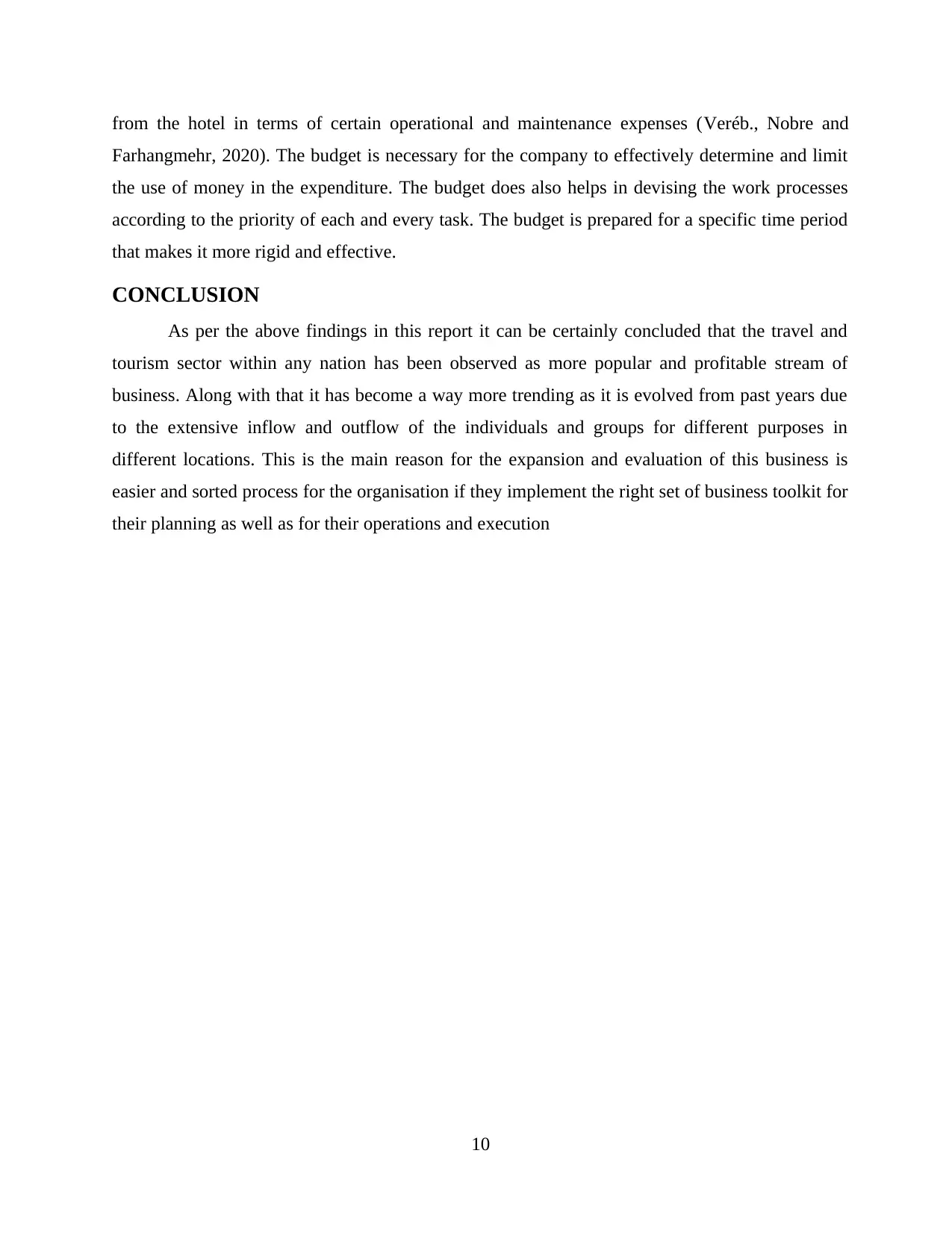
from the hotel in terms of certain operational and maintenance expenses (Veréb., Nobre and
Farhangmehr, 2020). The budget is necessary for the company to effectively determine and limit
the use of money in the expenditure. The budget does also helps in devising the work processes
according to the priority of each and every task. The budget is prepared for a specific time period
that makes it more rigid and effective.
CONCLUSION
As per the above findings in this report it can be certainly concluded that the travel and
tourism sector within any nation has been observed as more popular and profitable stream of
business. Along with that it has become a way more trending as it is evolved from past years due
to the extensive inflow and outflow of the individuals and groups for different purposes in
different locations. This is the main reason for the expansion and evaluation of this business is
easier and sorted process for the organisation if they implement the right set of business toolkit for
their planning as well as for their operations and execution
10
Farhangmehr, 2020). The budget is necessary for the company to effectively determine and limit
the use of money in the expenditure. The budget does also helps in devising the work processes
according to the priority of each and every task. The budget is prepared for a specific time period
that makes it more rigid and effective.
CONCLUSION
As per the above findings in this report it can be certainly concluded that the travel and
tourism sector within any nation has been observed as more popular and profitable stream of
business. Along with that it has become a way more trending as it is evolved from past years due
to the extensive inflow and outflow of the individuals and groups for different purposes in
different locations. This is the main reason for the expansion and evaluation of this business is
easier and sorted process for the organisation if they implement the right set of business toolkit for
their planning as well as for their operations and execution
10
⊘ This is a preview!⊘
Do you want full access?
Subscribe today to unlock all pages.

Trusted by 1+ million students worldwide
1 out of 13
Related Documents
Your All-in-One AI-Powered Toolkit for Academic Success.
+13062052269
info@desklib.com
Available 24*7 on WhatsApp / Email
![[object Object]](/_next/static/media/star-bottom.7253800d.svg)
Unlock your academic potential
Copyright © 2020–2026 A2Z Services. All Rights Reserved. Developed and managed by ZUCOL.





